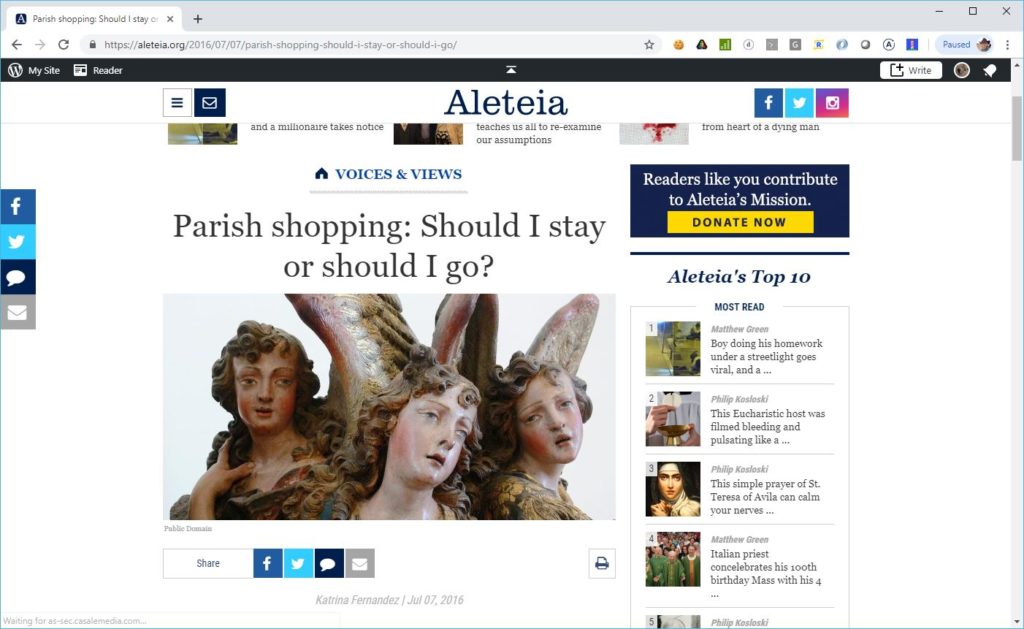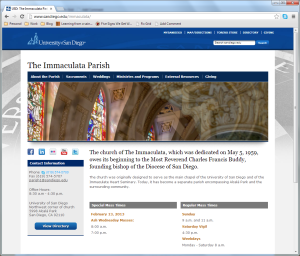Tag: Parish
Weekly Young Adult-only Mass?

A little while ago, one of my friends suggested that there should be a parish where there is a Young Adult Mass held every week for all members of the Diocese. The idea was that it would be really nice to have a place where the younger members of the Diocese could gather knowing that there would be lots of other young adults present. There would be superb music, excellent preaching and lots of young people.
There was a time in my own journey when I would have enthusiastically embraced this idea. In fact, in our Diocese we have a similar event each year, known as “Mega Mass”, where all the young adults come together and it’s very successful. However, I think that a weekly event would be extremely problematic.

No wrinklies allowed!
Aside from the politics of selecting a parish in the Diocese and personal preferences concerning music, establishing a young adult Mass would be difficult because it’s not like you could stop those who did not fall into the young adult age range from attending. As a consequence, if the young adult Mass were mostly made up of those outside the young adult age range, it is unlikely that it would attract many more young adults.
On the other hand, if the Mass did start to attract more and more young adults, I fear that it would end up depopulating other parishes of their young adults which I think would be disastrous. Something of this dynamic often exists naturally, with one or two parishes of the diocese being known as the “young adult parish”, robbing surrounding parishes of their young adults. Who will be the next generation in these parishes?
My other serious concern with an idea like this is that it plays into a kind of ecclesial consumerism which we’ve seen very clearly in the Protestant world. Obviously, we want music to be good, preaching to be inspiring and for our churches to be filled with the young, but part of me can’t help but think that to enter into such an initiative would be to start training people to think that these are the primary things which should be used to determine what makes going to Mass important. It also sets up a problem further down the line because what happens if the music takes a bit of a downturn? What if the homilies get a little stale? What if the young adult population dips? There will always be some other church somewhere which does it better and if that’s what we’ve trained people to value most, why would they want to stay in the Catholic Church?
What are you thoughts? Would you ever want to see a Young Adult Mass every week in the Diocese?
Parish Work
The Bogwash Epistles: Epistle #2
Music: Moonlight Hall Kevin MacLeod (incompetech.com)
 My dear Bogwash,
My dear Bogwash,
In my previous letter I asked you to make an effort to understand what makes your Patient tick and to probe him for weaknesses which we may exploit. Unfortunately, all you presented me with was several pages of drivel, full of useless information and ridiculous speculation. I expect to see a better effort in your next correspondence.
I see from reading your Patient’s file that his recent renewed allegiance to the Enemy was brought about through the chaplain at the university. That priest is well known to us, my dear Bogwash, well known indeed! He is a formidable warrior in the service of the Enemy. Oh, the problems that man has caused for us over the years! Plans have been underway for some time to limit his effect on the souls at that institution of learning. I hear that an experienced task force of tempters was recently assigned to his case. We have yet to find a way to ruin him, but trust me, we will…
Fortunately for you, your Patient will soon be graduating and his contact with that man will soon be limited. With graduation comes a time of change and flux and this period has great potential for us. There is always the risk that during this time of uncertainty your Patient will come to trust more in the Enemy, but it is also a wonderful opportunity for us, a perfect time to encourage him to cast off childish things…such as his newfound religion. Do your best to remind him of all the ways this new faith will limit his freedom and his enjoyment of the new, exciting world of adult life.
You Patient will soon be leaving the protective womb of the University Chaplaincy and enter the wider world. Once he has left the university, even if he persists in the service of the Enemy for a time, he will soon face many new trials which will almost certainly abort this nascent faith. Outside of the walls of the Chaplaincy he will encounter something truly terrifying – the typical Catholic parish!
Your primary task at this time is to quickly stunt the growth of this renewed faith. This requires a two-pronged approach. Firstly, your must do your best to alienate him from the Christian community, isolating him from his brethren who will support, encourage and guide him. On his own he will not last long. Fortunately, as I said, he will soon be moving into parish life, so this task may be done for you with very little assistance required on your part. Secondly, it must be your priority to cut him off from all the sources of strength given to him by the Enemy, in particular, the Sacraments and that abominable Eucharist. In my next letter, I will begin address the steps to be taken to eradicate, or at the very least diminish, the impact of those Sacraments upon the Patient.
Your affectionate mentor,
Professor Slubgob
Top Five Tips for Parish Websites
Yesterday I wrote a post about the importance of parish websites and how they can play a key role in attracting people to your parish and integrating them into parish life.
Today I would like to follow up on this topic and speak a little bit about some of the thought which should go into the construction and structure of your website. Having a website is not enough. It must also be functional and engaging.
With that in mind, here are my top five tips for parish websites:
1. “When’s Mass?”
If I’m going to a parish’s website, chances are I’m looking for the Mass and Confession times. Please don’t make me have to click around for five minutes and dig into submenus before finding them.
Parish Websites
 Okay, small rant alert…
Okay, small rant alert…
Bad parish websites. They have to stop. Seriously.
I never fail to be amazed at how little time, attention and money is devoted to the websites of some Catholic parishes. It’s 2013 people! Bad parish websites are now simply unacceptable.
If you arrived at a parish for Mass for the first time and you walked through the front door and are greeted by 70’s decor, peeling paint and a sparsely populated notice board containing only out-of-date notices, what conclusions would you reach about that parish? Well, having no website or an extremely poorly produced or out-of-date website is the digital equivalent of that today. A parish’s website, or lack thereof, is the first impression most people will have of that parish.
Word Of The Day: Paroikia
I’m currently preparing the next document we’re going to be reading in the JP2 Group: “The Martyrdom of Polycarp”. Polycarp was a 2nd Century Bishop in Smyrna about whom I’ve written before. I’ve got a lot to do, so I need to get back to my books soon, but before that, I just wanted to share with you something rather cool I’ve just found…
Stranger On The Shore
The account of Polycarp’s martyrdom begins with a covering letter:
“From the Church of God which resides as a stranger at Smyrna, to the Church of God temporarily sojourning in Philomelium, and to all the congregations of the Holy and Catholic Church in every place: may mercy, peace, and love from God the Father and our Lord Jesus Christ be yours in abundance”
– The Martyrdom of Polycarp (Greeting)
The author, a chap called Marcus/Marcion, describes Smyrna’s church as “resid[ing] as a stranger” and Philomelium’s church as “temporarily sojourning” in that city. This concept often comes up in the writings of the Early Church (Clement, Ignatius, …) and draws from an idea we also find expressed in Sacred Scripture:
“Dear friends, I urge you, as foreigners and exiles, …”
– 1 Peter 2:11
The early Christians were keenly aware that they did not permanently belong on this earth, but rather, were citizens of heaven, temporarily away from their homeland. As someone with a blog entitled “Restless Pilgrim”, who has traveled quite a bit and is currently living away from his native country, I find it quite easy to relate to this viewpoint.

- Strangers temporarily staying in a foreign land
Paroikia
So, in the martyrdom’s introduction, the author is simply expressing a deeply ingrained, Early Church mindset – that we reside here temporarily. However, what makes this really cool is that I’ve now seen the Greek. The noun which is used here is “παροικια”, or, in our alphabet, “paroikia” (pa-roy-kee-a) and it literally means “a sojourning” or “a dwelling in a strange land”.
“So what?” I hear you say.
“I’m glad you asked!” I reply.
“Paroikia” is the root of the word which was later used by Christians to describe the local assembly and its location: “parish”… This etymology tells us a profound spiritual truth. Particularly if you haven’t moved around much, it’s easy to think of your parish as your “home” – we even refer to our “home parish”. To an extent, this is true, but really, our parish, our “paroikia” is only a temporary dwelling, an outpost of Heaven. One day we will have to leave and head to our true and everlasting home.
“Christians are not distinguished from the rest of mankind by either country, speech, or customs; the fact is, they nowhere settle in cities of their own… They reside in their respective countries, but only as aliens. They take part in everything as citizens and put up with everything as foreigners. Every foreign land is their home, and every home a foreign land… They spend their days on earth, but hold citizenship in heaven.”
– The Epistle To Diognetus, 2nd Century


